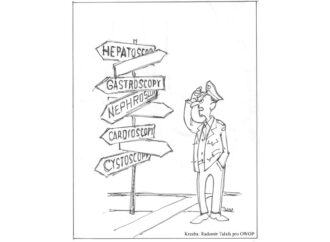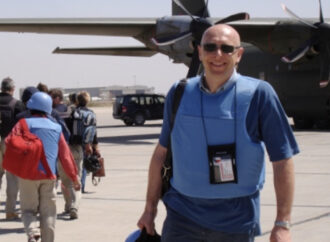
Seržant Wayne Gray z 82. výsadkové divize během střetu s Talibanem v afghánském Lógaru 20. srpna 2009; Foto svobodník Richard W. Jones Jr., U.S. Army
Mulla Umar, vůdce Talibanu na útěku se o víkendu nechal slyšet, že spojenecké síly v Afghánistánu budou čelit porážce a že by se měly poučit z historie.
„The more the enemy resorts to increasing forces, the more they will face an unequivocal defeat in Afghanistan.“
To, že se v Afghánistánu nedaří je patrné už několik let. Ale letošek je, ostatně dle předpokladů, zatím nejhorším rokem vůbec. Od začátku roku zahynulo 350 spojeneckých vojáků. Minulý čtvrtek to bylo dokonce šest Italů najednou. V tom, že je situace kritická se paradoxně shodnou jak Talibanci, tak soudní velitelé a politici.
Armádní generál Staneley McChrystal, který velí jednotkám ISAF doručil do Bílého domu v srpnu odhad situace a netrvalo dlouho a materiál je venku. Včera jeho neutajenou část otiskl díky Bobu Woodwardovi The Washington Post. A je to neradostné, byť zajímavé a poučné čtení (toto je odkaz na faksimile v pdf).
Co jsem viděl a četl v televizích a novinách se především soustředilo na to, že McChrystal „tlačí“ hlavně na zvýšení počtu sil a zároveň varuje před „selháním“, které záhy nastane, pokud síly NATO nezmění strategii a pokud se neobnoví důvěra Afghánců, o kterou spojenecké síly v uplynulých letech dobrovolně přišly. Vše však není ztraceno: Byť je situace vážná, je stále možné dosáhnout úspěchu, napsal generál.
McChrystal makes clear that his call for more forces is predicated on the adoption of a strategy in which troops emphasize protecting Afghans rather than killing insurgents or controlling territory. Most starkly, he says: „[I]nadequate resources will likely result in failure. However, without a new strategy, the mission should not be resourced.“
Co mně na zprávě zaujalo a co jsem si nikde moc nepřečetl (a už vůbec ne na hlavní stránce NATO, škoda) jsou McChrystalovy připomínky k mezinárodním silám ISAF. Je to důležité proto, že jedině pokud se změní přístup k ISAFu a ISAFu samotného k problémům v Afghánistánu, může se něco změnit. Takže, generál na adresu mezinárodních sil tvrdí:
- ISAF is a conventional force that is poorly configured for COIN, inexperienced in local languages and culture, and struggling with challenges inherent to coalition warfare. These intrinsic disadvantages are exacerbated by our current operational culture and how we operate. Pre-occupied with protection of our own forces, we have operated in a manner that distances us — physically and psychologically — from the people we seek to protect. In addition, we run the risk of strategic defeat by pursuing tactical wins that cause civilian casualties or unnecessary collateral damage. The insurgents cannot defeat us militarily; but we can defeat ourselves.
- Improve unity of effort and command. We must significantly modify organizational structures to achieve better unity of effort. We will continue to realign relationships to improve coordination within ISAF and the international community.
- ISAF must now adopt a fundamentally new approach. The entire culture — how ISAF understands the environment and defines the fight. how it interacts with the Afghan people and government. and how it operates both on the ground and within the coalition1- must change profoundly.
- ISAF must restore confidence in the near-term through renewed commitment, intellectual energy, and visible progress.
- ISAF must use existing assets in innovative and unconventional ways, but ISAF will also require additional resources, forces and possibly even new authorities. All steps are imperative and time is of the essence. Patience will see the mission through; but to have that chance, real progress must be demonstrated in the near future.
A to je jenom pár vět. V dokumentu je toho mnohem víc. Jsem jediný, komu přijde ISAF jako jeden velký malér? Nutno podotknout, lidé v poli se dokáží přizpůsobit (vzpomínáte na Yinglingovo „adapt or die“?), ale – ťuk, ťuk, ťuk – co ti doma? Politici vystrašení veřejným míněním, byrokrati, kterým jsou ti na misích ukradení. Teď je to na vás a moc času nezbývá, než se to bude muset celé odpískat.
Je načase udělat několik závažných kroků:
- změnit kulturu přístupu k Afghánistánu
- posílit jednotky dle požadavků generála McChrystala
- zrušit národní omezení (caveats)
- přestat s mikromanagamentem z hlavních měst a jednotky plně podřídit velení ISAF
- obrnit se trpělivostí a občas se pomodlit
Musí to být jinak než doposud. Je to poslední šance a McChrystalův recept je jasný:
This is now a population centric campaign and no effort should be spared to ensure that the Afghan people are part ofthe conversation. Receiving, understanding, and amending behavior as a result of messages received from audiences can be an effective method of gaining genuine trust and credibility. This would improve the likellhood of the population accepting ISAF messages and changing their behavior as a result.
Afghánci toho začínají mít totiž plné zuby (jak mnohem diplomaticky řekl nový náčelník britského generálního štábu Sir David Richards):
“Over 80 per cent of the Afghan population still doggedly want their government and the international community to succeed, although their patience with our failure to meet the expectations of progress we ironically have done much to create is undoubtedly beginning to flag.”
Což vede k posilování Talibanu, jak vcelku bez servítků připomíná šéf CENTCOMu generál David Petraeus:
“The Taliban without question have expanded their strength and influence” in certain districts of Afghanistan,” he told a select audience of military, security services and political figures at the Policy Exchange think tank. In many districts there was the feeling of a “downward spiral present” in terms of progress. The Taliban were funding their campaign not only by the drugs trade and crime but also with “donations from outsiders”.
Je tomu dobré dát šanci a ne nyní hovořit o stahování. Italská ztráta minulý týden byla velká a Italové si zaslouží veškerou úctu, ale Silvio Berlusconi by měl se stahováním počkat:
The attack led to Italian Prime Minister Silvio Berlusconi saying Italy now wanted to reduce its deployment in Afghanistan but only with agreement from NATO partners. „We are keen to bring our boys home as soon as possible,“ Berlusconi said.










Leave a Comment
Your email address will not be published. Required fields are marked with *